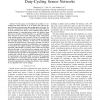Free Online Productivity Tools
i2Speak
i2Symbol
i2OCR
iTex2Img
iWeb2Print
iWeb2Shot
i2Type
iPdf2Split
iPdf2Merge
i2Bopomofo
i2Arabic
i2Style
i2Image
i2PDF
iLatex2Rtf
Sci2ools
162
click to vote
INFOCOM
2012
IEEE
2012
IEEE
Towards energy-fairness in asynchronous duty-cycling sensor networks
Abstract—In this paper, we investigate the problem of controlling node sleep intervals so as to achieve the min-max energy fairness in asynchronous duty-cycling sensor networks. We propose a mathematical model to describe the energy efficiency of such networks and observe that traditional sleep interval setting strategy, i.e., operating sensor nodes with identical sleep intervals, or intuitive control heuristics, i.e., greedily increasing sleep intervals of sensor nodes with high energy consumption rates, hardly perform well in practice. There is an urgent need to develop an efficient sleep interval control strategy for achieving fair and high energy efficiency. To this end, we theoretically formulate the Sleep Interval Control (SIC) problem and find it a convex optimization problem. By utilizing the convex property, we decompose the original problem and propose a distributed algorithm, called GDSIC. In GDSIC, sensor nodes can tune sleep intervals through a local information exch...
Related Content
| Added | 28 Sep 2012 |
| Updated | 28 Sep 2012 |
| Type | Journal |
| Year | 2012 |
| Where | INFOCOM |
| Authors | Zhenjiang Li, Mo Li, Yunhao Liu |
Comments (0)

